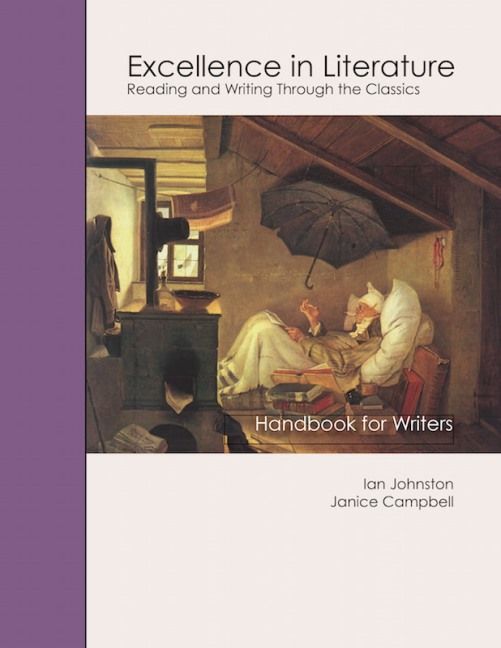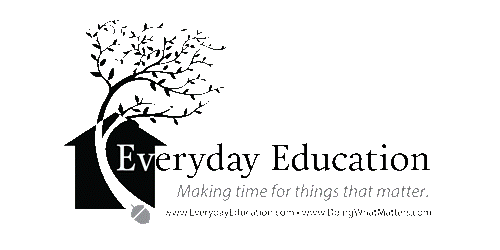I have a rising high schoolers, and as I am getting ready and preparing for High School and eventually university or college, one of things my son and I came to agree on is that he most likely will be heading for a major or minor in English. He has always loved writing stories. So, when the chance to review a product relating to writing for the High Schooler came up for reviews I volunteered, of course, even if he won't be officially in High School till next school year.
The product in question is Excellence in Literature Handbook for Writers put out by Everyday Education, LLC. What it is is as the name suggest a handbook for writers that will help the student to become a better writer as he prepares to enter college. It covers essay writing and punctuation, style and usage. It is a hefty book ( 420 pages). I received the e-book version and downloaded on several devices for easy access. What does it contain?
Part I: Everything to know about writing Essays and Arguements

The authors are very qualified:
At this time I was most interested in the clauses, sentences, structure, usage and style section. The handbook gives you the guidelines and tips for good writing, therefore it tells you what not to do, what to avoid and how to best expressed thoughts in a way that grammatically correct and expresses it best. Here is an example:
This handbook could be just read through as well, as there are a lot of information in there that you may not think you need to know, but is really handy to know, as it turns out. Here is another example:
Everyday Education offers other pretty cool products, check them out on their social media.
Pinterest: https://www.pinterest.com/janicecampbell/
FB: https://www.facebook.com/janicepcampbell
FB page: https://Facebook/excellenceinlit/
LinkedIn: https://www.linkedin.com/in/janicepcampbell
Google+: https://plus.google.com/u/0/+JaniceCampbell
Twitter: https://twitter.com/everydayedu


The product in question is Excellence in Literature Handbook for Writers put out by Everyday Education, LLC. What it is is as the name suggest a handbook for writers that will help the student to become a better writer as he prepares to enter college. It covers essay writing and punctuation, style and usage. It is a hefty book ( 420 pages). I received the e-book version and downloaded on several devices for easy access. What does it contain?
Part I: Everything to know about writing Essays and Arguements
- Arguments: setting up, defining terms
- Deduction and induction
- Organizing the main body
- Paragraph structure and functions
- Writing arguments about literary works
- Sample outlines of essays and research papers
- Critical approaches to Shakespeare
- Literary evaluation criteria

Part II: Everything about usage and style
- Grammar covering phrases, sentence structures, clauses
- Word usage covering a lot of homophones, misused words and plurals
- Punctuation
- Pronoun
- Parallelism or Parallel structure
- Modifier, gerund and infinitives
- Clarity, logic and structure
- References and biographies
- Basic format for essays and research papers
It also includes some reference sheets at the end of the book:
- Visual Guide to Organizing Your papers
- The Six Sections of an Approach Paper
- Things a Paragraph can do
- Rubric for Writing Evaluation

The authors are very qualified:
- Ian Johnston, retired instructor, graduate from McGill Inuversity, Bristol University and University of Toronto
- Janice Campbell, writer, conference speaker and graduated homechool mom. She is a graduate from Mary Baldwin College in English.
At this time I was most interested in the clauses, sentences, structure, usage and style section. The handbook gives you the guidelines and tips for good writing, therefore it tells you what not to do, what to avoid and how to best expressed thoughts in a way that grammatically correct and expresses it best. Here is an example:
"1.10 Compound Subject as a Single UnitI am looking forward to using more of this with my kids as they write more. This is great to use as a stand alone or in connection with a writing curriculum where you have to write essays or arguments. If you are not sure about something relating to how to say or express something, you will find a answer there. If you are looking for style, usage and structure help, you will find an answer there too.
Occasionally, a compound subject will take a singular verb. This normally occurs
only when the two nouns form a single unit and always appear together as a
unit (e.g., macaroni and cheese, ham and eggs, hack and squirt, rock and roll, fish
and chips, and so forth).
Macaroni and cheese is my favorite food.
Rock and roll is a cacophonous form of audio entertainment." (p.243)
This handbook could be just read through as well, as there are a lot of information in there that you may not think you need to know, but is really handy to know, as it turns out. Here is another example:
"7.6 Use of AsAll in all I give this product two thumbs up as a very useful and handy resource for any aspiring (or not) writer, parents included!
Be careful with the word “as” when you use it to introduce a dependent clause.
Usually the word is a poor choice because it is inherently ambiguous.
As I drove home, the argument started.
Does as here mean since, or while, or when? The reader is not certain. So rather
than using as here, select the most precise word to express what you mean (since,
while, or when).
7.7 Use of Transitions
Use transition words frequently and properly to indicate the logical flow of your
paragraph, especially in relation to the previous paragraph. The skilful use of transition
words and phrases is one of the best and most sophisticated ways to keep the
reader in very close and clear contact with your argument.
Some of the commonest words and phrases which function as effective indicators
of logical transitions are the following:......" (p.340)
Everyday Education offers other pretty cool products, check them out on their social media.
Pinterest: https://www.pinterest.com/janicecampbell/
FB: https://www.facebook.com/janicepcampbell
FB page: https://Facebook/excellenceinlit/
LinkedIn: https://www.linkedin.com/in/janicepcampbell
Google+: https://plus.google.com/u/0/+JaniceCampbell
Twitter: https://twitter.com/everydayedu





Comments